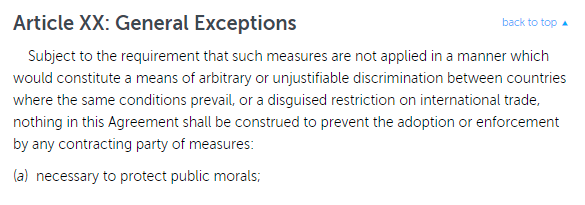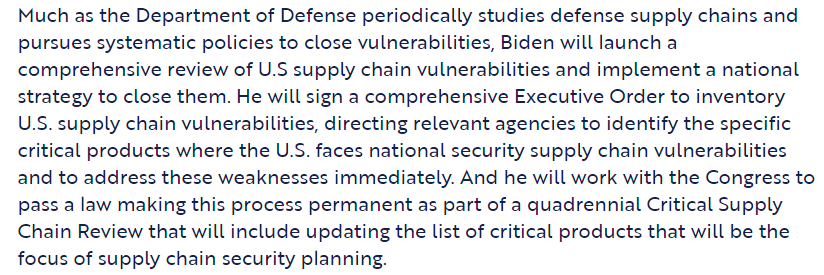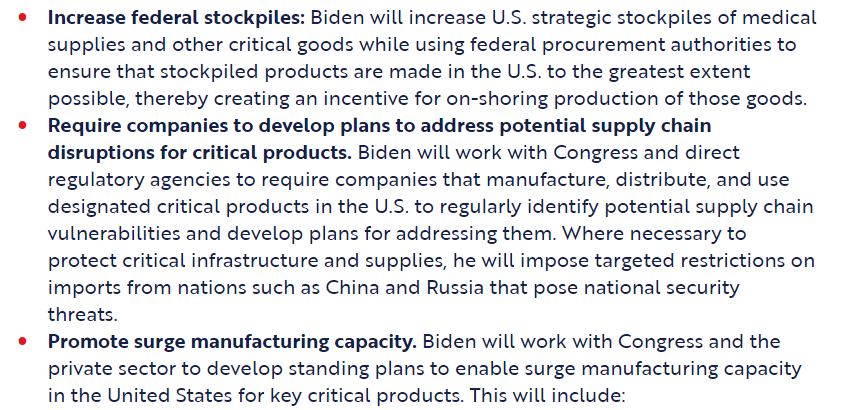
Joe Biden wants to replace the US federal vehicle fleet with electric vehicles Made in America. How will we know if an EV counts as "American" under our procurement laws? A thread...
pcmag.com/news/president…
pcmag.com/news/president…
It turns out that this is far from a straightforward question, as two statutes called the Buy American Act of 1933 (BAA) and Trade Agreements Act of 1979 (TAA) interact in complicated ways...
Depending on the country of origin of the components of the vehicle, how much the vehicle costs, and which country the final assembly is in, the answer of whether an EV gets the Buy American treatment can change. Here's a flow-chart showing just how complicated this is. 

Full disclosure: I am not a lawyer, though I have played one on TV. It could be that some part of this is off, in which case I will update.
The question out of the gate will be will the purchase of each car in the fleet be considered an individual procurement, or is the fleet-as-a-whole be considered as a single procurement.
If the former, then this all gets a lot simpler: at least 55 percent of the cost of components will have to be American-made. Since Chevy Bolts (e.g., last time I checked) have 80% South Korean and 20% US components, a net shift of 35% Korea-to-US production will have to occur. 

And that's before the Biden administration announces what if any increases to that percentage it plans to add on. (The Trump administration increased the US content requirement from 50 to 55% on its last full day in office.)
jdsupra.com/legalnews/sign…
jdsupra.com/legalnews/sign…
If the procurement is considered on a fleet-wide basis (i.e. over $182k), then we get into really tricky territory - due to international obligations that the US took on in the Tokyo Round of GATT talks in 1979 to give certain trade partners the Buy American treatment. 

Fun fact: Trump threatened to pull out of one of the most consequential of these trade pacts: the WTO's Government Procurement Agreement (GPA). Had he, the question considered in this thread would have been easier to answer.
politico.com/news/2020/11/1…
politico.com/news/2020/11/1…
Although not totally. Other agreements like NAFTA 2.0 / USMCA also have procurement commitments that get Mexican and Canadian products the Buy American treatment, and the dollar threshold is lower: $83.1k relative to $182k under the GPA.
ustr.gov/issue-areas/go…
ustr.gov/issue-areas/go…
If you look at the lower right corner of the flowchart, you can see that the Trade Agreements Act appears to create a perverse outcome.
A Korean-assembled car with 80% Chinese content would be charged a tariff by US customs officials under the US-Korea FTA, because it would not qualify for that deal's "rules of origin."
Yet the same car could receive Buy American treatment from US procurement officials. Not that any conceivable US administration would ever incur this PR nightmare. But the outcome does seem possible under the complicated layered statute.
Anyway, further support for the one-two punch at the Monday press conference: modernize Buy American rules domestically as well as internationally. There's a lot of antiquity there to get started on.
https://twitter.com/toddntucker/status/1353835030485880834
A few other odds and ends: while EVs aren't at parity with non-EVs, even the high end is well below the GPA/NAFTA threshold... if each car is considered on its own.
roadandtrack.com/news/a35307672…
roadandtrack.com/news/a35307672…
And here is a primer on how "domestic end product" differs from "US-made end product" in the US code. No, they are not the same thing, and yes, that is confusing.
fcw.com/Articles/1997/…
fcw.com/Articles/1997/…
And federal courts this year opened up another loophole in Buy American, and this one goes right to the top right of the flowchart.
natlawreview.com/article/what-d…
natlawreview.com/article/what-d…
Courts watered down what it means to be "manufactured" in the US. In the Acetris case: "because the foreign-sourced ingredients were measured, weighted, mixed, and compounded in the U.S. , the final end products (i.e., the pills) were manufactured in the U.S."
Notably, the API in the pills in question that the VA was purchasing came from India - which is not a party to a US trade/procurement agreement, but through this court-invented loophole - gets the benefit of Buy American without giving the US anything in return.
The other problematic part of the Acetris decision is that its puts the onus on the procurement authorities of EACH FEDERAL AGENCY to ascertain all these supply chain questions. They can't rely on Customs and Border Patrol - you now, the agency that checks and knows these things.
The whole Acetris case kind of underlines a theme in my work of the last few years: trade deals / ISDS are often problematic from a jurisprudence coherence / social desirability perspective, but increasingly US courts are giving the international lawyers a run for their money.
If anyone wants to consult the Federal Acquisition Regs on these points, here ya go.
acquisition.gov/far/52.225
acquisition.gov/far/52.225
• • •
Missing some Tweet in this thread? You can try to
force a refresh








